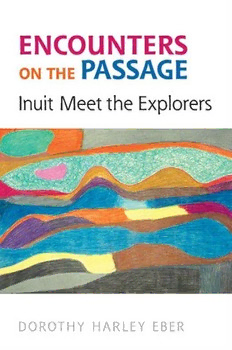
Encounters on the passage: Inuit meet the explorers PDF
Preview Encounters on the passage: Inuit meet the explorers
ENCOUNTERS ON THE PASSAGE: INUIT MEET THE EXPLORERS ‘First communication with the natives of Prince Regents Bay, as drawn by John Sackheouse and Presented to Capt. Ross. Augt 10. 1818.’ ENCOUNTERS PASSAGE ON THE Inuit Meet the Explorers DOROTHY HARLEY EBER UNIVERSITY OF TORONTO PRESS Toronto Buffalo London © Dorothy Harley Eber 2008 University of Toronto Press Incorporated Toronto Buffalo London www.utppublishing.com Printed in Canada ISBN 978-0-8020-9275-5 Printed on acid-free paper Library and Archives Canada Cataloguing in Publication Eber, Dorothy Encounters on the passage : Inuit meet the explorers / Dorothy Harley Eber. Includes bibliographical references and index. ISBN 978-0-8020-9275-5 1.Northwest Passage – Discovery and exploration – British. 2.Inuit – Nunavut – History. 3.Oral tradition – Nunavut. 4.Explorers – Northwest Passage – History. 5.Explorers – Nunavut – History. 6.Oral history. I.Title. E99.E7E335 2008 910.9163(cid:99)27 C2008-905150-5 In different form, short sections of this book have appeared in ‘Recording the Spirit World,’ Natural History Magazine (August 2002); ‘Eva Talooki: Her Tribute to Seed Beads, Long-Time Jewels of the Arctic,’ Innuit Art Quarterly (Spring 2004); ‘A Chance Encounter with Simon Tookoome,’ Inuit Art Quarterly (Spring 2001); and ‘Rumours of Franklin,’ The Beaver (June/July 1996). University of Toronto Press acknowledges the financial assistance to its publishing program of the Canada Council for the Arts and the Ontario Arts Council. University of Toronto Press acknowledges the financial support for its publishing activities of the Government of Canada through the Book Publishing Industry Development Program (BPIDP). Illustration on previous pages: ‘First communication with the natives of Prince Regents Bay, as drawn by John Sackheouse and Presented to Capt. Ross. Augt. 10. 1818.’ Sackheouse, a Greenlandic Eskimo who served Ross as an interpreter, shows Captains John Ross and Edward Parry with the ‘wild people,’ or Arctic Highlanders as Ross named them, in Northern Greenland, at the outset of the British nineteenth-century search for the Northwest Passage. To the memory of GFE, who gave me the tape recorder, and to the interpreters of the North, past and present, without whose work the written history of the North would be merely a white man’s story. This page intentionally left blank Contents Acknowledgments ix Introduction xi Chronology and Maps of Principal Nineteenth- and Early Twentieth-Century Arctic Expeditions by Sea xxi Prologue: Opening Salvos 3 1 Into the Arctic Archipelago: Edward Parry at Igloolik and the Shaman’s Curse 12 2 John Ross at Kablunaaqhiuvik – the ‘Place for Meeting White People’ 37 3 The Franklin Era: Burial of a Great White Shaman 64 4 The Death Marches: ‘They were seen carrying human meat’ 74 5 New Franklin Stories: The Ship at Imnguyaaluk 84 6 A Northwest Passage on Foot – and Lost Opportunity 108 7 Norwegian Victory: ‘Amusi’ and the Prize 116 8 Modern Times 131 Appendix 1: Rumours of Hudson 137 Appendix 2: Charles Francis Hall and the Lost Men 139 Notes 143 Illustration Credits 159 Index 161 This page intentionally left blank Acknowledgments This book draws in the main on personal interviews conducted and tape-recorded in locations across Nunavut, and occasionally on the tele- phone, from 1994 to 2008. I owe my sincerest thanks to all those I inter- viewed for so patiently answering my questions. I was fortunate enough to work with amazingly talented interpreters, and I would like to express my admiration for their remarkable skills and my thanks for their major contribution to this book. I am most grateful, too, to have had the opportunity to read and to quote from the transcripts of inter- views done with the elders of Igloolik and held in the archives of the Inullariit Elders’ Society at the Igloolik Research Centre. Among the able interpreters who assisted me in Nunavut, I particularly want to mention Tommy Anguttitauruq, Lisa Ell Ipeelie, Oleepa Ikidluak, Leah Otak, Louise Anaija, James Pamioyok, and Christopher Amautinuar. I thank also Pia Pootoogook, who sadly died before this book was pub- lished, and Papak Panegyuk, both of whom helped with the review of certain sections of tape back in Montreal. This book depends also on the records, excerpts from which are freely quoted, of expeditions to the Canadian Arctic, from those of Mar- tin Frobisher in the sixteenth century to those of Sir William Edward Parry, Sir John Ross, and Sir Richard Collinson in the nineteenth cen- tury, and Roald Amundsen, Vilhjalmur Stefansson, and Knud Rasmus- sen in the twentieth. I am indebted, too, to the many insights in books on nineteenth-century and early twentieth-century Arctic exploration. Among earlier studies, I would like to mention R.J. Cyriax’s Sir John Franklin’s Last Arctic Expedition (London: Methuen & Co. 1939), still one of the best books on the Franklin tragedy, and L.P. Kirwan’s The White Road (London: Hollis & Carter, 1959). Particularly helpful among more
